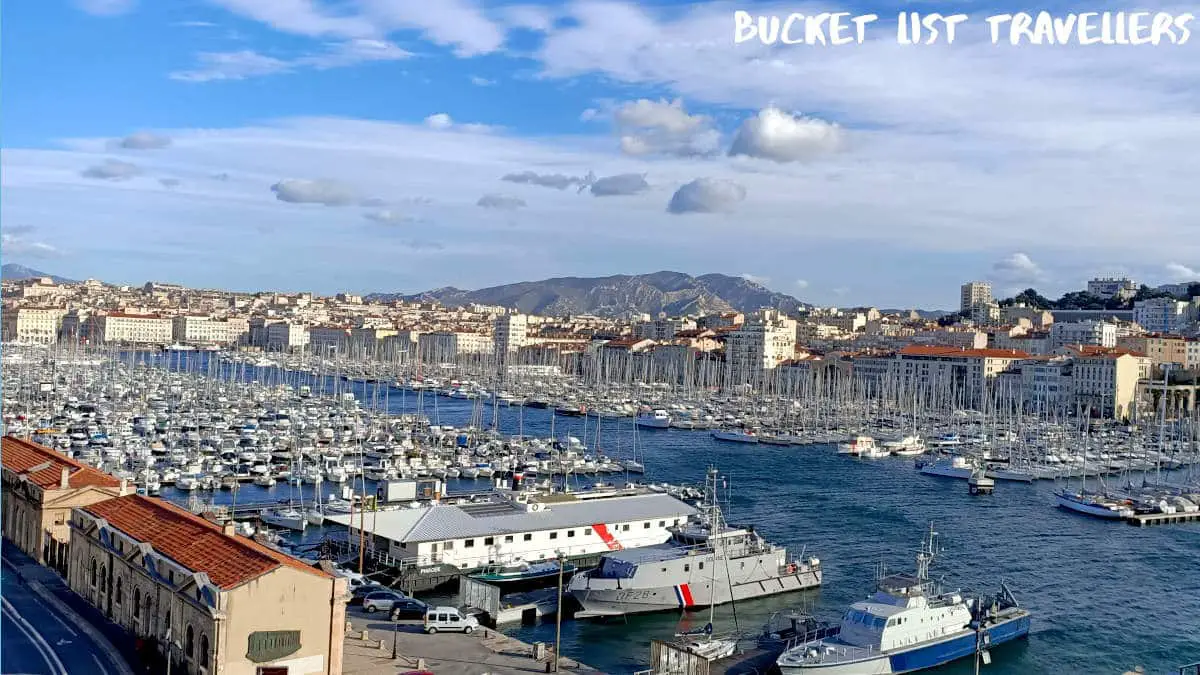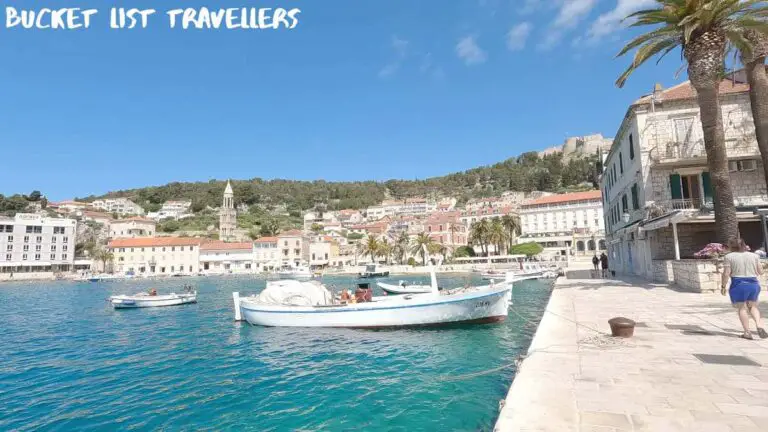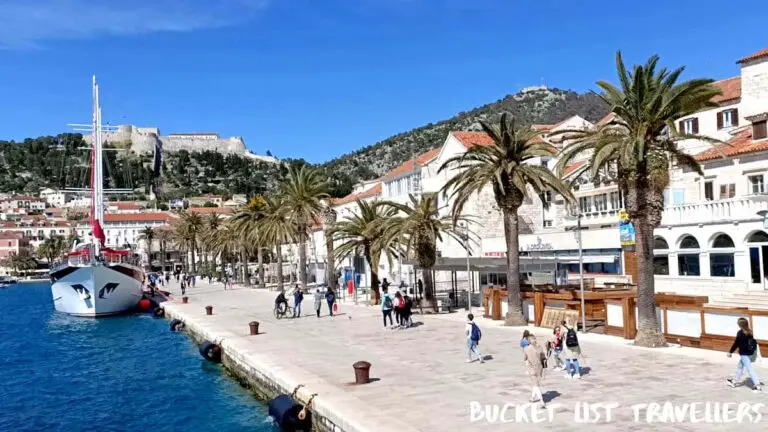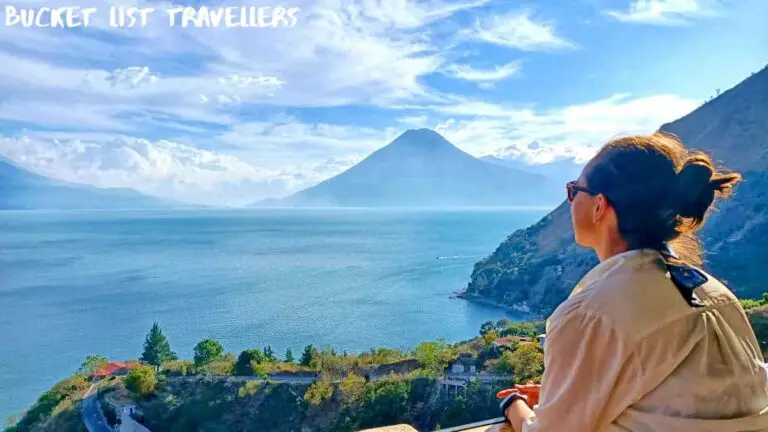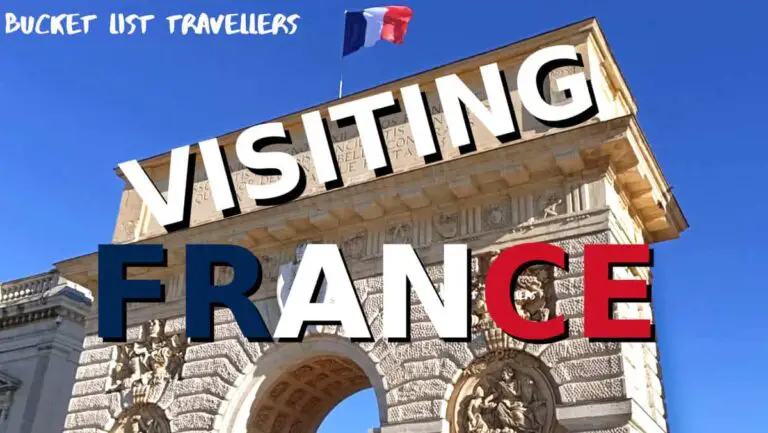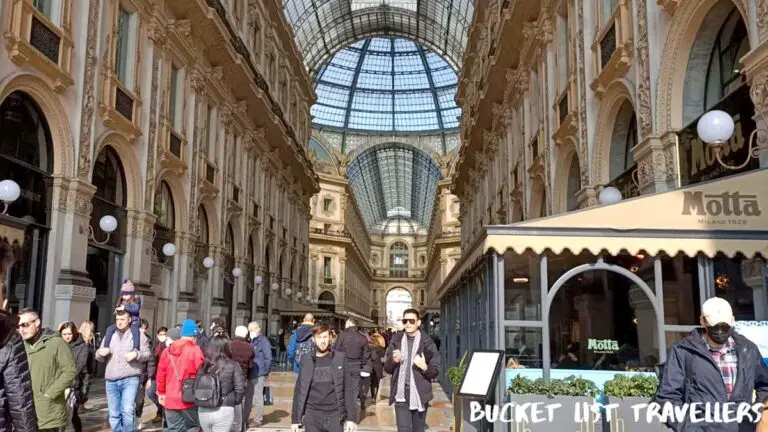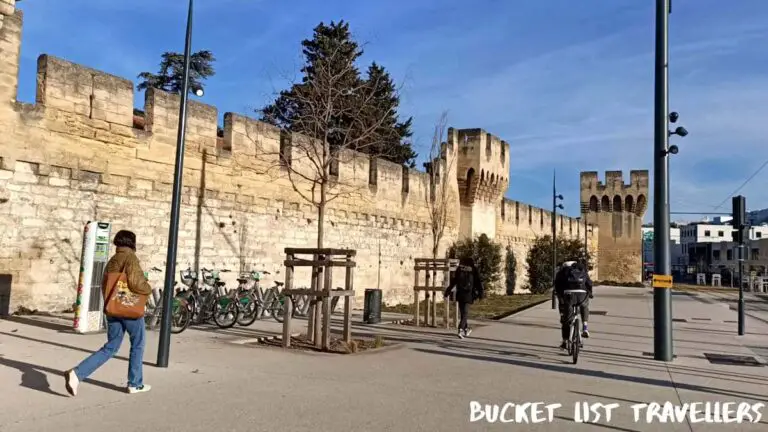The cosmopolitan port city of Marseille has a distinct character that is unlike anywhere else in France. This port city is a cultural melting pot with strong North African influences. It has a long history, spanning back to 600 BC and it has been a significant trading port in the many years since. The city has also established itself as a centre of culture and of gastronomy. It is filled with museums and galleries as well as narrow lane ways adorned in street art. It is also home to a wide selection of restaurants serving up cuisine such as the regional dish bouillabaisse. In this Marseille destination guide we show you everything this city has to offer so you can plan your next French vacation.
Short on time? Here are our Marseille France top recommendations:
Highlights: admire the Basilique Notre-Dame de la Garde, stroll around the Vieux-Port de Marseille and savour some authentic bouillabaisse.
Activities: book your Marseille France Tours with Get Your Guide.
Accommodation: we use Booking.com to find the best hotels.
Transport: TrainLine for trains and FlixBus for intercity buses.
Flights: find cheapest flights with cashback on WayAway.
Airport Lounge Access: start your holiday the right way with Priority Pass.
Travel Medical Insurance: SafetyWing Nomad Insurance is the ideal choice for long-term travellers and digital nomads.
What is Marseille famous for?
Marseille is famous for its Bouillabaisse – a traditional fish soup originating from Marseille. Additionally, Marseille is known as the oldest city in France and also one of Europe’s oldest continuously inhabited settlements. As the biggest port in France, it also acts as a bridge between North Africa and Europe and is a gateway to the French Riviera.
Why you should visit Marseille France
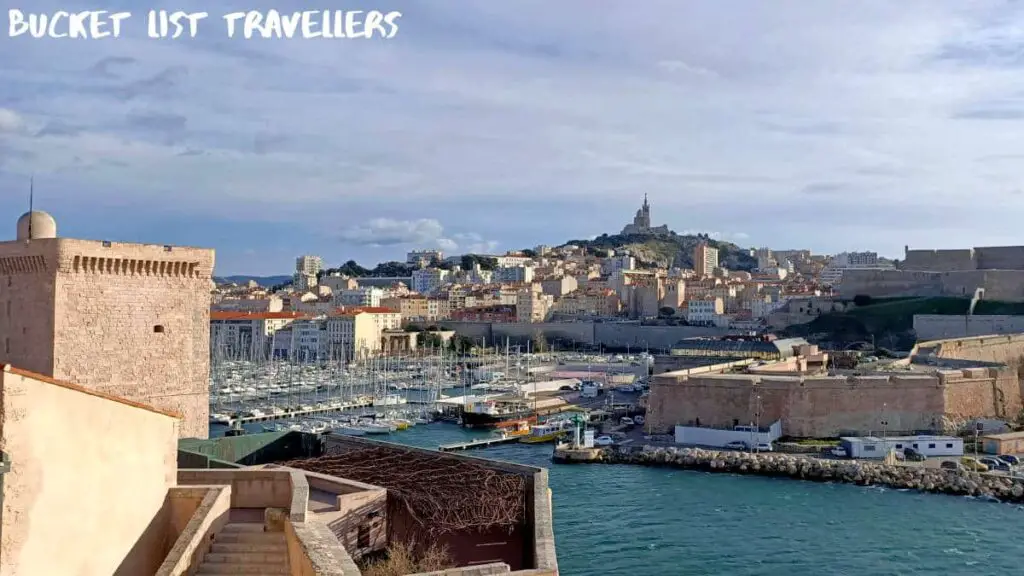
Gritty and rough around the edges, Marseille is a city with plenty of character. This port city is one of the major gateways to France. The second largest city in France, its close proximity to North Africa is evident in the culture and the cuisine of the city. As the oldest city in France, Marseille has seen its fair share of history. This can be experienced in the many museums and historic landmarks throughout the city such as the Basilique Notre Dame de la Garde and the Old Port.
Marseille Destination Guide: Know before you go
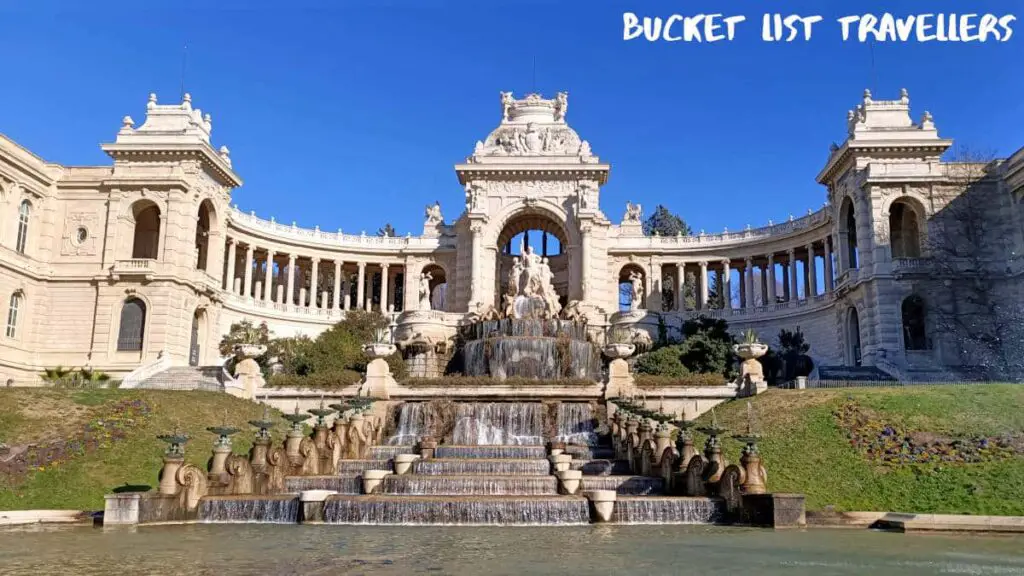
Basic info about Marseille France
- Language – French, although the regional language Occitan is still spoken by a small portion of the population. English is spoken to some extent, particularly in hotels and tourism businesses. However not everyone you meet will be able to speak English. We find that if you at least attempt to speak a bit of French, you will get a warmer reception than if you just assume everyone speaks English. In our experience, most people we’ve spoken to start speaking English as soon as they hear our feeble attempts at speaking French.
- Currency – euro (EUR). This has been the official currency of France since 2002. Currency exchanges can be found in Marseille and ATMs are widely available.
- Population – 862,000 (2015)
- Area – 241 km2 (93 sq mi)
- Department – Bouches-du-Rhône. Marseille is the capital of this department.
- Region – Provence-Alpes-Côte d’Azur
Utilities in Marseille France
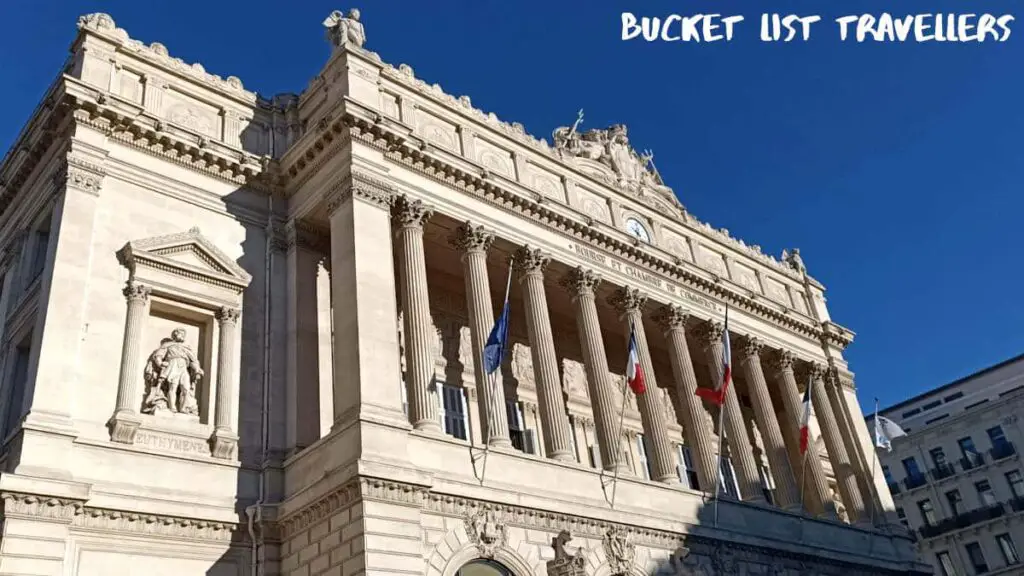
- Electricity – France uses Types C and E power plugs. The country operates on a 230v supply voltage at 50Hz. Power outages are not common in France.
- Water – the tap water in Marseille is safe to drink. In cafes and restaurants, you can ask for a “caraffe d’eau”, and the waiter will bring you a pitcher of water that is free and safe to drink.
- Toilets – sit-down flushing toilets are the most common type of toilet in France. You can flush your toilet paper directly into the bin. Public toilets are common in France. Many public toilets are free to use, but some charge anywhere from 50 cents to 2 euros to use.
- Telephone country code: +33
Where is Marseille France?
Marseille is the capital of the Bouches-du-Rhône department in the Provence-Alpes-Côte d’Azur region of southern France. It is a port city on the Mediterranean Sea in the French Riviera.
The closest major French cities to Marseille are Aix-en-Provence, Toulon, Avignon, Nîmes, Cannes, Nice as well as Montpellier. Marseille is less than one hour by train from Aix-en-Provence, Toulon as well as Avignon, 1.5 hours by train from Nîmes, 2 hours by train from Cannes and around 3 hours from Montpellier as well as Nice. Due to being a major port on the Mediterranean Sea as well as the second largest city in France, many international trains stop at Marseille.
How to get to Marseille France
Marseille destination guide: Arriving by land
Marseille France intercity land transport
The main transport options for travelling overland to Marseille France are:
- Private vehicle
- Private transport operator
- Navette (Shuttle Bus) – this runs from Marseille Airport to the Marseille Saint Charles train station. The cost is 10 euro per person for a one way ticket or 16 euro return (price as at 2024). The journey time is approximately 25 minutes.
- Train
- Bus
- Bike
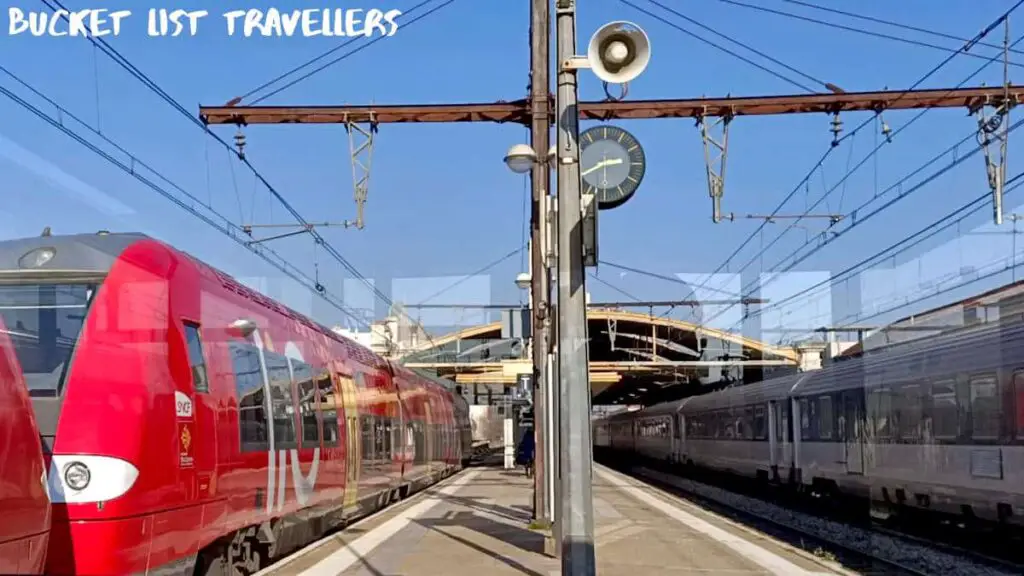
Driving to Marseille from within France
If you are driving to Marseille from within France
, here are the travel times and distances:
- Aix-en-Provence – 33 minutes (34km, 21miles) without tolls
- Toulon – 46 minutes (65km, 40miles) with tolls or 1 hour 9 minutes (63km, 39miles) without tolls
- Avignon – 1 hour 7 minutes (103km, 64miles) with tolls or 1 hour 36 minutes (126km, 78miles) without tolls
- Nîmes – 1 hour 26 minutes (123km, 76miles) with tolls or 1 hour 31 minutes (119km, 74miles) without tolls
- Cannes – 1 hour 51 minutes (173km, 107miles) with tolls or 2 hours 4 minutes (164km, 102miles) without tolls
- Montpellier – 1 hour 55 minutes (169km, 105miles) with tolls or 2 hour 7 minutes (166km, 103miles) without tolls
- Nice – 2 hours 8 minutes (200km, 124miles) with tolls or 3 hours 38 minutes (217km, 135miles) without tolls
- Paris – 7 hours 19 minutes (775km, 482miles) with tolls or 10 hours 43 minutes (901km, 560miles) without tolls
Intercity trains to Marseille France
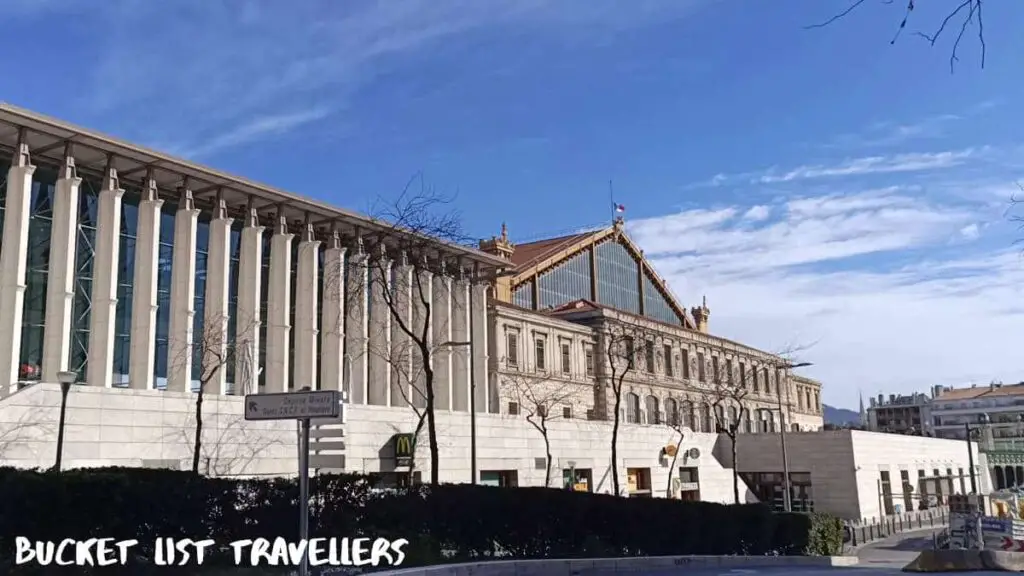
Trains are a cheap and efficient way to get to Marseille France. The main train station in Marseille is Marseille Saint-Charles. This is located in the heart of Marseille.
The following train brands service Marseille:
- TGV train – this is France’s intercity high speed rail service.
- TGV Bruxelles-France train – this intercity high speed rail service covers Belgium and France. This line runs from Brussels Belgium to Marseille France.
- AVE train – this is Spain’s intercity high speed rail service. The AVE line which services Marseille runs from Marseille France to Madrid Spain.
- TGV-Alleo – this intercity high speed rail service covers Germany and France. This line runs from Frankfurt Germany to Marseille France.
- TGV Lyria – this intercity high speed rail service covers Switzerland and France. This line runs from Geneva Switzerland to Marseille France.
- Thalys – this is the French/Belgian high speed rail service. The Thalys line runs from Rotterdam Netherlands to Marseille France.
- Eurostar – this is the UK’s intercity high speed rail service. The Eurostar line runs from London England to Marseille France.
- TGV Ouigo – this is France’s low-cost high speed rail service.
- Intercités – this is a non-high speed rail service which operates on the ‘classic’ rail network in France.
- TER (Transport Express Régional) – the TER rail service is run by the regional councils of France.
The French national railway company is SNCF.
We recommend using the app and website TrainLine to book intercity train tickets in France. This is the app we used. We found it very easy to use with great functionality. Another great feature is that you can see days ahead to see what times of the day were the cheapest rates. The TrainLine app was much easier to use than the SNCF website and app, which we found really cumbersome and difficult to use.
Intercity buses to Marseille France
A common way to get around France is by using intercity buses. These are a budget friendly alternative to trains, but are generally a slower option. Intercity bus companies operating in Marseille France include FlixBus as well as Blablacar Bus. Popular bus destinations from Marseille include:
- Cannes France – travel time 2-4 hours. Tickets start from 3 euro one way.
- Montpellier France – travel time 1.5-2.5 hours. Tickets start from 3 euro one way.
- Paris France – travel time 9-13 hours. Tickets start from 15 euro one way.
- Barcelona Spain – travel time 6-8 hours. Tickets start from 17 euro one way.
- Milan Italy – travel time 7-9 hours. Tickets start from 20 euro per way.
Marseille destination guide: Arriving by air
The nearest airport to Marseille France is Marseille Airport (Airport code MRS). This international airport is 27km (17miles) northwest of the city. It has 2 terminals and is currently the 5th busiest airport in France.
Other nearby airports include:
- Toulon Airport (Airport code TLN). This airport is 84km (52miles) away.
- Avignon Airport (Airport code AVN). This airport is 93km (58miles) away.
- Nîmes Airport (Airport code FNI). This airport is 114km (71miles) away.
- Montpellier Airport (Airport code MPL). This is 169km (105miles) away.
- Nice Airport (Airport code NCE). This is 198km (123miles) away.
The national airline of France is Air France.
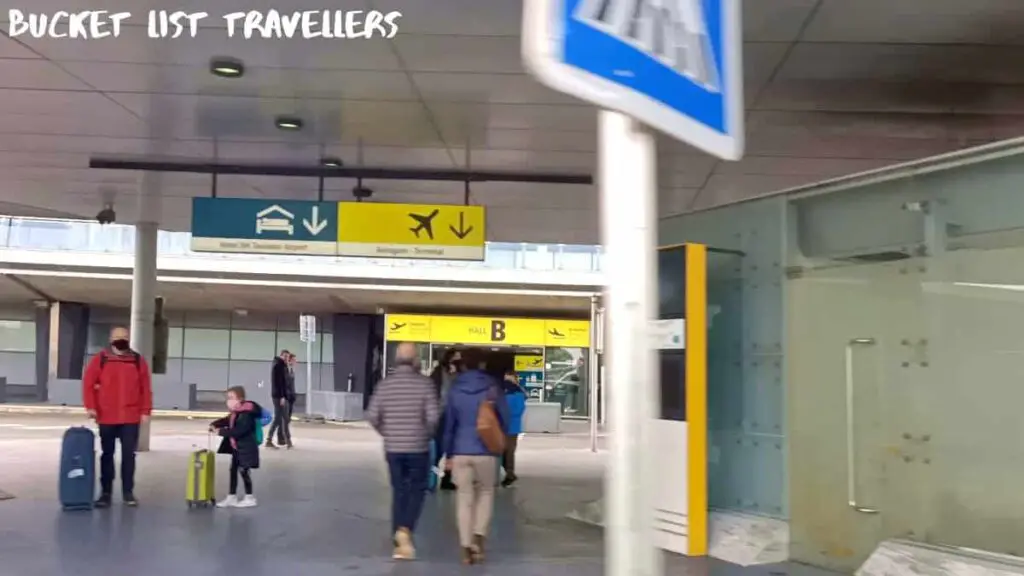
Marseille destination guide: Arriving by boat
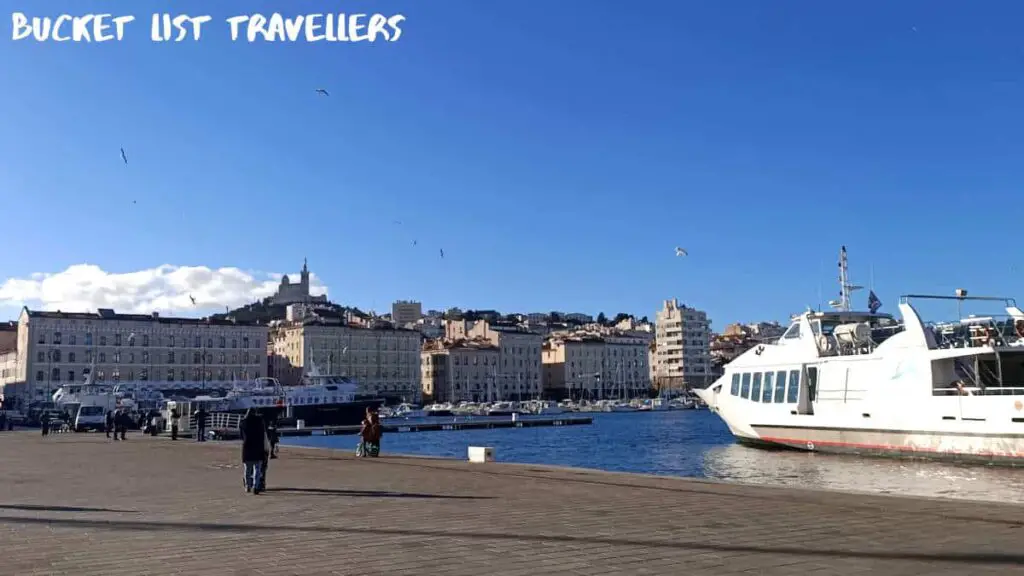
The city of Marseille is on the Mediterranean Sea. Marseille ferry port is the largest commercial port on the Mediterranean Sea. From Marseille, there are ferries to Corsica, Tunisia, Algeria & Morocco. There are up to 11 ferry crossings from Marseille per day. However availability may vary depending on the season.
Ferries from Marseille to Corsica
There are around 25 ferries per week from Marseille to Corsica. These ferries connect Marseille to 5 different destinations in Corsica – Ajaccio, Bastia, Ile Rousse, Porto Vecchio as well as Propriano. The sailing time is between 10 and 13.5 hours. A one-way ticket for a foot passenger is around 35-80 euro (price as at 2022). There are 2 ferry companies that operates between Marseille and Corsica – Corsica Linea as well as La Méridionale.
Ferries from Marseille to Tunisia
There are around 9 ferries per week from Marseille to Tunisia. These ferries connect Marseille to 2 different destinations in Tunisia – Tunis as well as Zarzis. The sailing time is between 19 and 36 hours. A one-way ticket for a foot passenger is around 150-250 euro (price as at 2022). There are 2 ferry companies that operates between Marseille and Tunisia – Corsica Linea as well as CTN Ferries.
Ferries from Marseille to Algeria
There are around 3 ferries per week from Marseille to Algeria. These ferries connect Marseille to Algiers in Algeria. The sailing time is 23 hours. A one-way ticket for a foot passenger is around 250-300 euro (price as at 2022). There is one ferry company that operates between Marseille and Algeria – Corsica Linea.
Ferries from Marseille to Morocco
There are around 3 ferries per week from Marseille to Morocco. These ferries connect Marseille to Tangier Med in Morocco. The sailing time is 42 hours. A one-way ticket for a foot passenger is around 100 euro (price as at 2022). There is one ferry company that operates between Marseille and Morocco – La Méridionale.
Marseille destination guide: How to get around Marseille France
Walking in Marseille France
By far the easiest and cheapest way to get around Marseille is to walk. Marseille is a large city, but most of the major tourist attractions are within walking distance of each other.
Local buses in Marseille France
Local buses service Marseille.
Trams in Marseille France
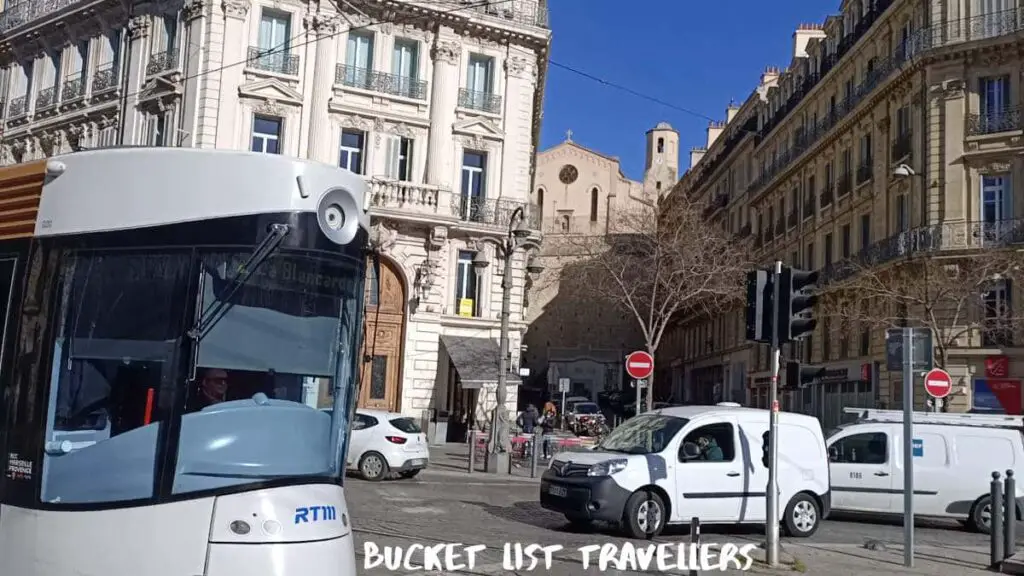
The Marseille tramway is a three-line tram system which services Marseille. There are currently 32 stations in the network.
Métro trains (subway or underground) in Marseille France
The Marseille metro is a two-line train system which services Marseille. There are currently 31 stations in the network.
Vehicle hire in Marseille France
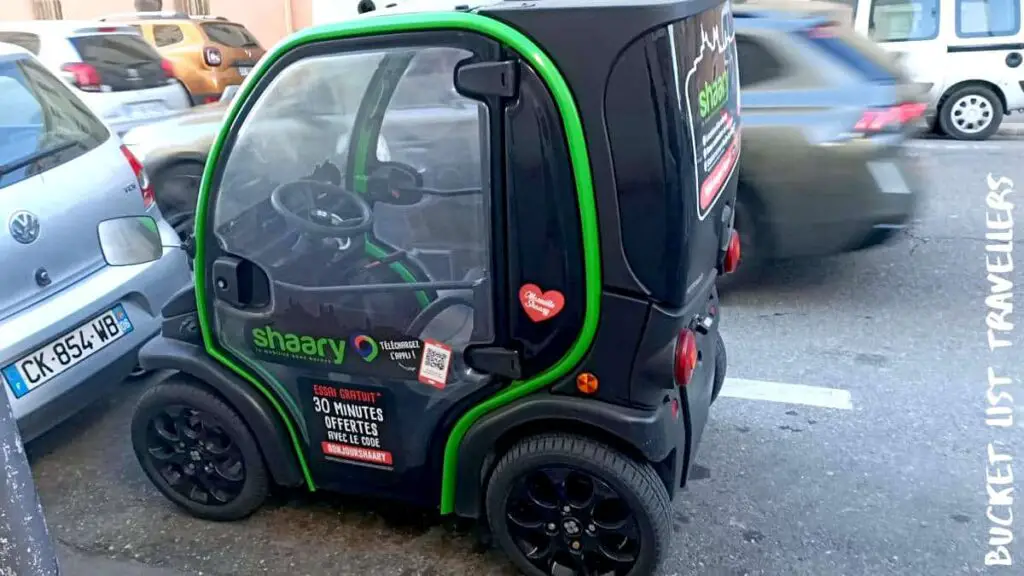
A wide variety of vehicles can be rented in France. This includes:
- Bicycles – There are self-service bike share services available in the city from companies such as Le Vélo. Alternatively you can hire a bike from a bike hire shop such as South Spirit Bike.
- Electric scooters – electric scooters are another popular mode of transportation in France. They are lightweight and less bulky compared to bikes. Expect to pay around 10 euro an hour.
- Motorcycles
- Cars
- SUVs
- Campervans
- Boats
The French drive on the right side of the road.
Navettes (shuttles) in Marseille France
Navettes make short repetitive journeys between two destinations. Common journeys include going between the airport and the city centre. These journeys can be booked on demand for a fixed price. There is a navette from Marseille Airport to the Marseille Saint Charles train station. The cost is 10 euro per person for a one way ticket or 16 euro return (price as at 2024). The journey time is approximately 25 minutes.
Navettes Maritimes (maritime shuttles or boat buses) in Marseille France
Boat shuttles weather dependent and additionally the number of services vary by season. There are three different maritime shuttle routes in Marseille:
- Old Port-Red Point
- Old Port-Static
- Pointe Rouge-Les Goudes
A one-way crossing is 5 euro (price as at 2024) and included in each fare is a one-hour connection to use the bus, metro and tram network.
Taxis in France
Taxis are common in France. Fares are regulated and are usually metered. The exception to this will be standard journeys such as airport trips. In this case the fare will be a fixed price. However in general your fare will include the following costs:
- The pickup fee or minimum fee – this is charged as soon as you get into the vehicle
- There may also be an additional fee for extra people or heavy luggage
- A reservation fee – this will be higher if you book in advance compared to if you want a taxi immediately
- Price per kilometre – this price can vary depending on the time of day
- Price per hour – this is a price that gets charged when the taxi is stuck in heavy traffic. The price also varies depending on the time of day
Ride-share services in France
There are many rideshare services operating in France. These include Uber, Lyft, InDriver and Carpool.
Marseille France destination guide: Is Marseille France worth visiting?
Marseille has a unique character and is definitely worth visiting. This port city has a distinctive blend of African and French cultures which is very different to other cities in France. It has a long and interesting history and a wide range of tourist attractions. It also has a spectacular food scene including many regional specialities, fresh local seafood as well as a treasure trove of Michelin star restaurants. However the city has a grittier vibe and has higher crime rates compared to other areas of France, which may be considerations when deciding if Marseille is the right destination for you.
Marseille destination guide: How long to spend in Marseille France
Marseille is a great place to come for a weekend. It is a very livable, cosmopolitan city which can easily keep you entertained for much longer. We spent 4 days in Marseille and enjoyed taking time to enjoy the various activities available in this beautiful city.
Marseille destination guide: What to do in Marseille France
Marseille is a beautiful French city with many activities on offer. It has a range of great free activities as well as paid activities.
Marseille destination guide: Free things to do in Marseille France
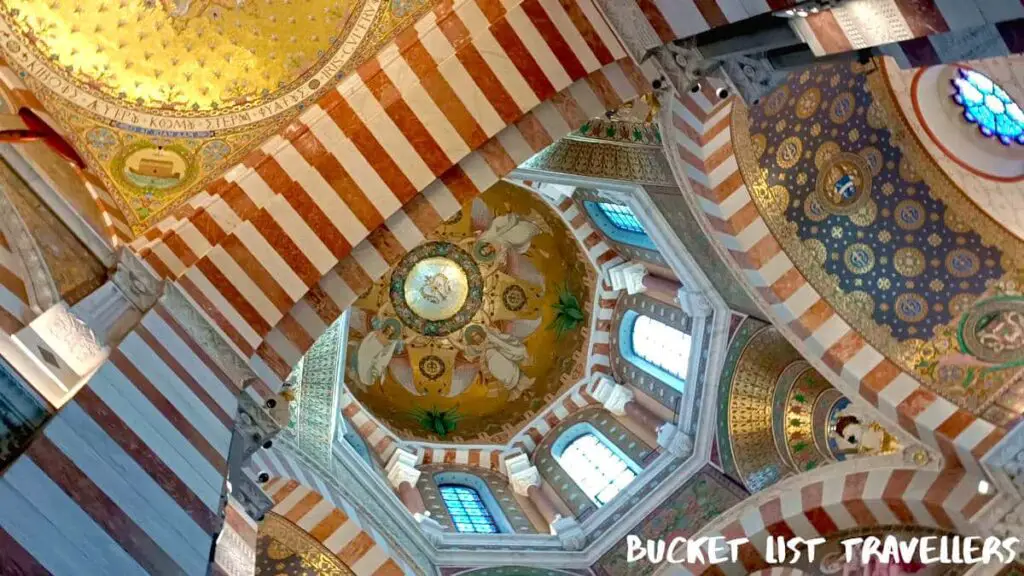
There are enough free activities in Marseille France to keep you entertained for a weekend or even a leisurely week:
- Basilique Notre-Dame de la Garde
- Parc National des Calanques
- Vieux-Port de Marseille
- The Panier neighbourhood
- Palais Longchamp
- Cite Radieuse Le Corbusier
- Vallon des Auffes
- Cathédrale de la Major
- Calanque de Sormiou
- Palais du Pharo
- La Corniche Kennedy
- Abbaye Saint-Victor
- Calanque de Morgiou
- Musée d’histoire de la Ville de Marseille
- Parc Borély
- Les Docks Village
- Le Cours Julien
- Les Halles de la Major
- Musée d’Archéologie Méditerranéenne
- L’Ombrière de Norman Foster
- Eglise Saint Laurent
- Friche la Belle de Mai
- Musée des Docks Romains
- Office Métropolitain de Tourisme et des Congrès de Marseille
For more details, see our Marseille travel guide on the 24 Best Free Things To Do in Marseille France.
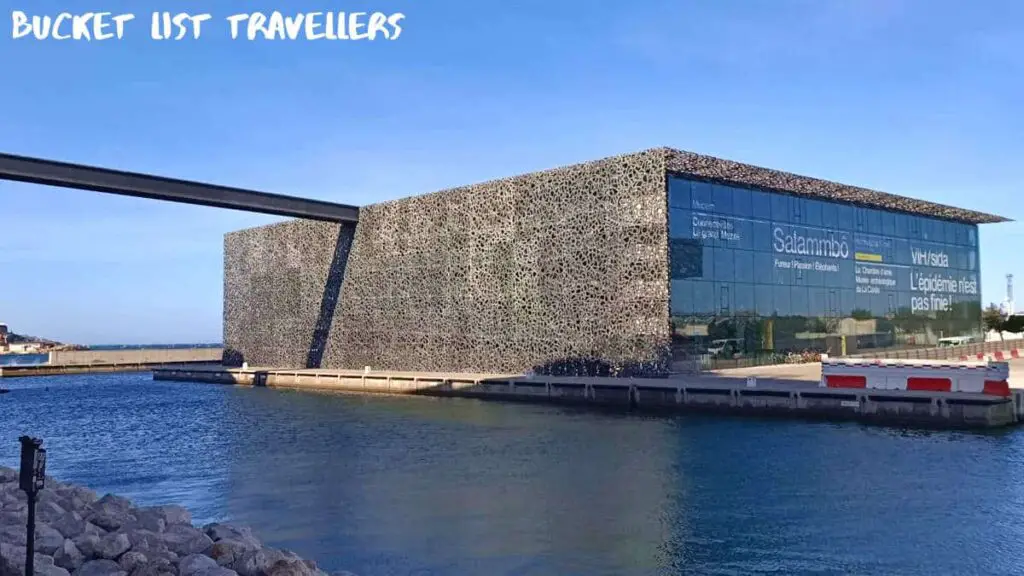
On the 1st Sunday of every month entry to Marseille museums is free. This includes:
- Mucem – Museum of Civilizations of Europe and the Mediterranean. On other days the entry fee is 11 euro for adults (as at 2024).
- Centre de la Vieille Charité. On other days the entry fee is 6 euro for adults (as at 2024).
- Musée d’Archéologie Méditerranéenne. On other days the entry fee is 6-12 euro for adults (as at 2024).
Marseille destination guide: Paid activities in Marseille France
A number of attractions in Marseille France charge an entry fee:
- Château d’If – entry fee is 7 euro for adults and free for under 18s (as at 2024)
- Îles du Frioul – entry fee is 5.7 euro for adults and the round trip ferry is 11.10 euro (as at 2024)
- Orange Vélodrome – entry fee is 18 euro for adults (as at 2024)
Weather in Marseille France
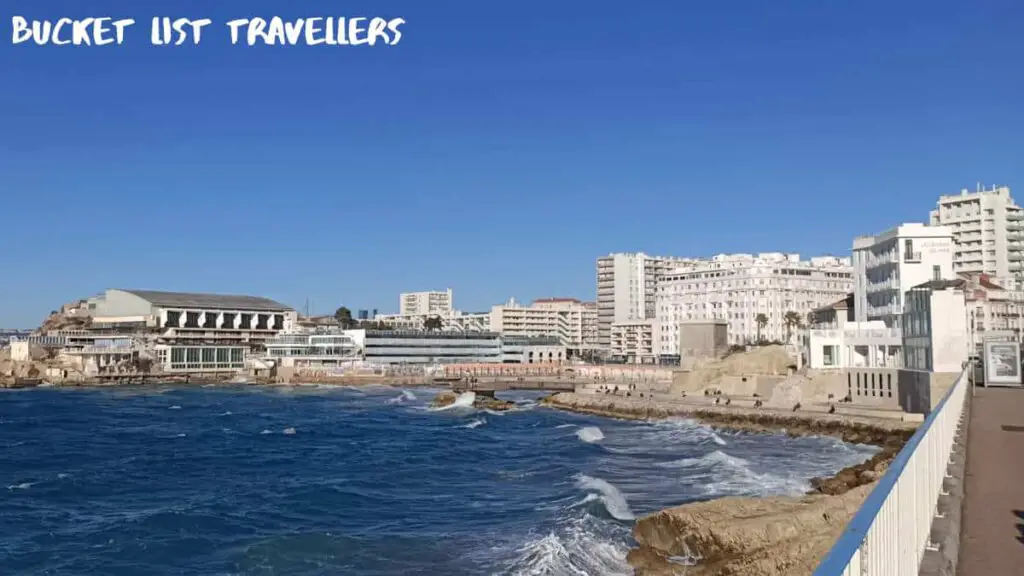
Marseille enjoys a warm temperate climate. Its climate is heavily influenced by the nearby Mediterranean area. It has cold winters, with average temperature range between 4°C and 12°C in the coldest month of January. Summers last from June to September and are hot and sunny, with the average temperature range between 19°C and 28°C in the hottest month of July. It is a windy city and experiences frequent and sometimes powerful winds. Snow is rare but not unheard of in Marseille. The month with the most rainfall is October with 7.0 days of rain on average and the driest month is July with an average of 1.8 rainy days.
Best time to visit Marseille France
The peak season in Marseille is from June to August, and the city’s beaches, restaurants and attractions get quite busy during this time. We’d recommend visiting Marseille during the shoulder season months of April and May or September and October when the weather is pleasant and it is not too crowded. One important point to note is that during winter Marseille experiences strong cold winds known as La Mistral, which can be quite unpleasant, so we’d recommend avoiding Marseille during this time.
Internet and mobile phones in France
Since June 15th, 2017, Roam Like at Home (RLAT) rules came into force for European Union (EU) countries. As such, people with EU mobile numbers are no longer charged temporary mobile roaming fees if they travel within the European Union. This means that if you have a European Union mobile number, you can use that number anywhere within the European Union and you will be charged for calls, texts and data in the same way as if you were in your home country. There are limits to this in order to prevent abuse of these rules.
The main internet and phone companies in France include Orange, SFR, LeFrenchMobile, Bouygues Telecom, Lebara, Lycamobile and Free.
5G has been in France since November 2020. However 2G is expected to continue in France until 2030.
Cell phone SIM cards can be bought in many places throughout France. These include phone stores, some supermarkets, newspaper kiosks as well as online.
How much to budget for Marseille France?
Is Marseille expensive?
Marseille caters to a wide range of budgets. Accommodation costs are reasonably affordable, as are transport costs both to the city as well as within Marseille. It is also possible to keep food costs down by shopping at bakeries and local markets. However if you have the budget to splash out there are also many high-end restaurants and accommodation options available.
Marseille destination guide: Daily spend for a couple travelling in Marseille France
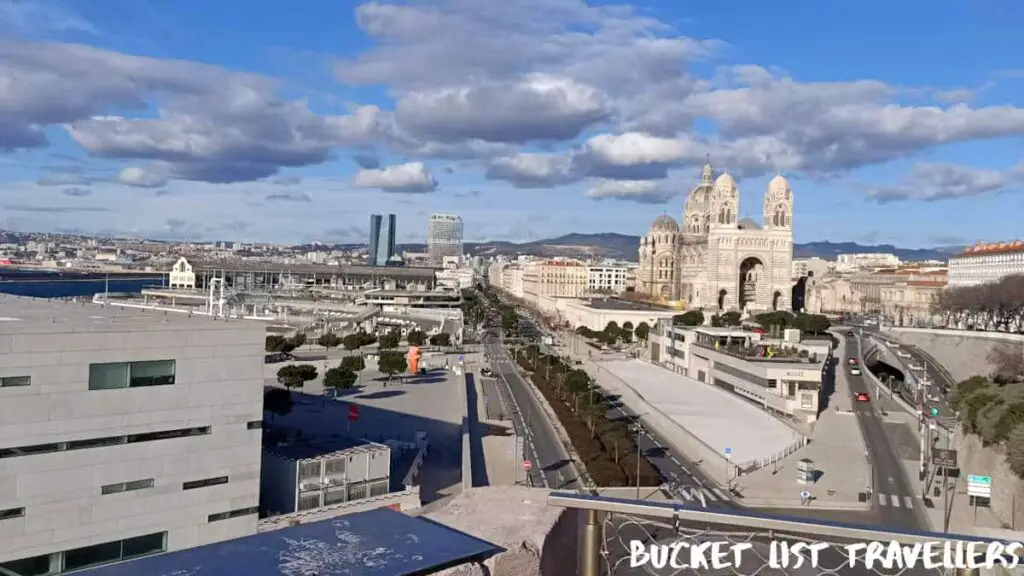
As a rough guide, we recommend the following budgets for a couple:
- Low-budget daily spend – 100 euro per day for a couple will get you budget accommodation, self catering and bakery meals, walking, using Le Vélo bikes or catching local transport to get around the city and free or cheap activities.
- Mid-range daily spend – 300 euro per day for a couple will get you mid-range accommodation, walking, using Le Vélo bikes or catching local transport to get around the city, dining at reasonably priced cafes and restaurants and some paid activities.
- Luxury spend – 1000+ euro per day for a couple will get you a premium experience in France, staying at luxury hotels, travelling by private transport, doing a range paid activities and eating at high end restaurants.
Marseille destination guide: Accommodation in Marseille France
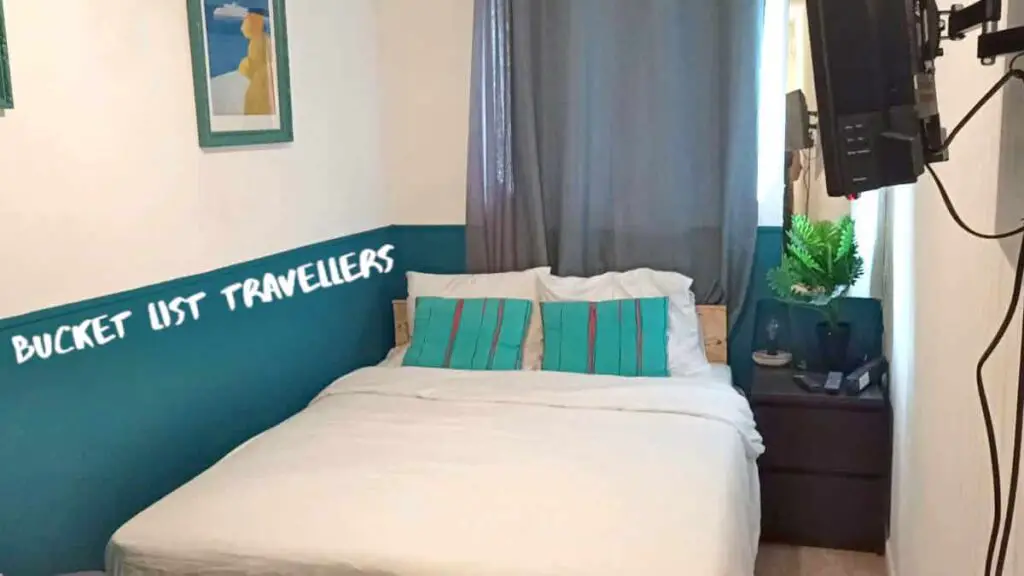
There is a good range of accommodation to suit most budgets in Marseille France. Airbnb operates in France and we were impressed with the range of options available in Marseille.
Where to stay in Marseille France?
We recommend the following accommodation in Marseille France:
- Best bed & breakfast in Marseille France – GinkGo is a rustic homestay with a relaxed vibe. It is about 15 minutes drive from Marseille and well positioned for hiking in Calanques National Park. The property has a garden filled with medicinal plants and which the owner uses to make tea each day. Breakfasts are delicious vegan spreads. The house is lovely and the host is kind and hospitable.
- Best 4 star hotel in Marseille France – Grand Hôtel Beauvau- Mgallery overlooks Vieux Port and is in a perfect location for exploring Marseille. The rooms are spacious and have a great mix of traditional furniture and modern comfort. Their breakfasts are amazing and the staff are exceptional.
- Best luxury 5 star hotel in Marseille France – Hotel C2 is a modern hotel with a minimalist design. It is conveniently located near Vieux Port. The rooms are spacious and clean with wonderful amenities. The staff are incredibly friendly and professional. Additionally the breakfasts are fantastic with a great range of tasty food. There is also an excellent spa on-site.
- Best furnished apartment in Marseille France – Les Appartements du Vieux Port are beautiful bright apartments close to Vieux Port. Each apartment is clean and well equipped, furnished and decorated. The beds are very comfortable with quality bedding. Additionally, the reception staff are very friendly.
How much is accommodation in Marseille France?
For short-term accommodation, a general price per night is as follows:
- Budget accommodation – 23-25 euro for a dorm
- Mid-range accommodation – 35-170 euro for a private room
- Luxury accommodation – 200-800 euro a night for a luxury hotel
- Rental property – 100-600 euro a night for a fully furnished 3-5 bedroom home
Marseille destination guide: Food in Marseille France
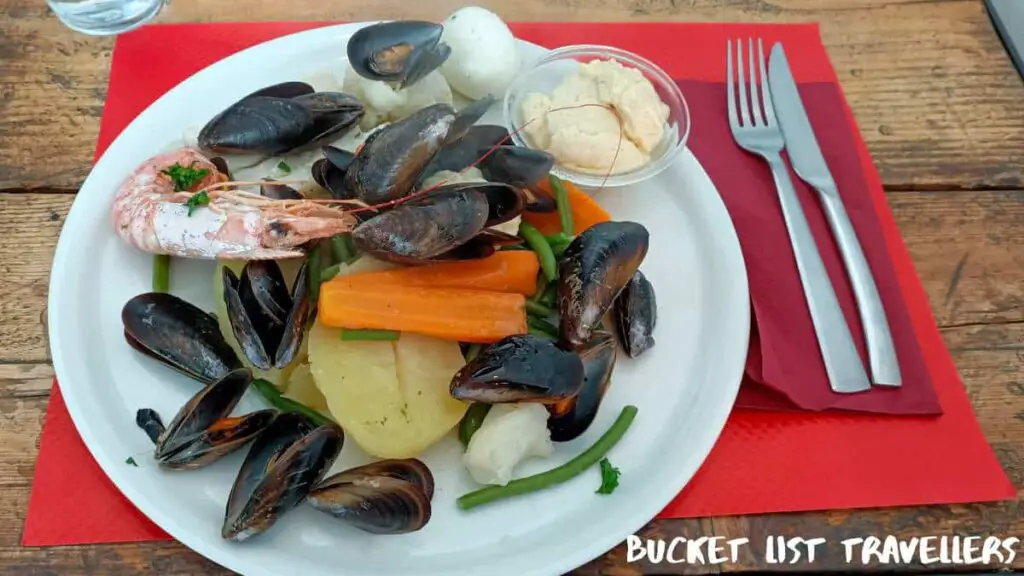
Being on the water, seafood is very popular in Marseille. The traditional Provençal fish stew Bouillabaisse comes from here. Mussels or Moules Marinière are also very popular, and forget to try Aïoli served with fish and vegetables. Pizza also has a long tradition in Marseille and even has its own style of pizza.
How much does food cost in Marseille France?
Our price guide for your food budget in Marseille France is as follows (prices as at 2022):
- Restaurant meal – 15-20 for a main dish
- Bakery food – 1-2 euro for a croissant or baguette, 2-3 euro for a slice of pizza
- Glass of wine – 4-6 euro
- Coffee – 3-4 euro
- Dinner at 3 Michelin star restaurant – 300-650 euro per person
Regional dishes in Marseille France

- Bouillabaisse
- Moules Marinière
- Aïoli (typically served with vegetables and fish)
- Pizza
- Paniesse
- Pissaladière
- Pieds et Paquets
- Tapenade
- North African Food
- Madeleines
- Navettes
- Chichi frégi
- Pastis
- Cassis wine
Cheap Eats in Marseille France
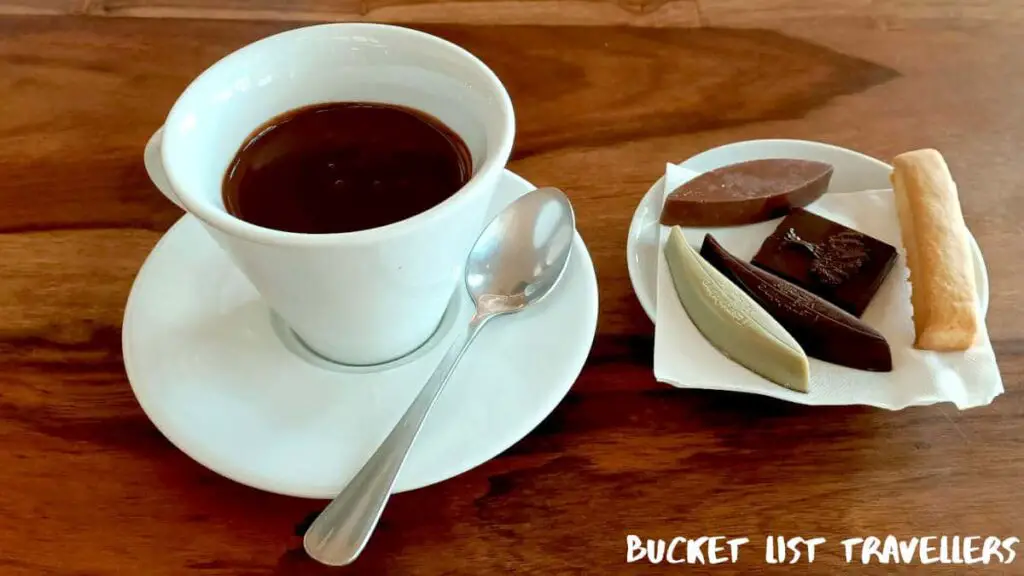
- Boulangeries (French bakeries) are a great place to get cheap and delicious food. Baguettes are typically around 1 euro. Croissants and pain au chocolat are also around 1 euro. Other common food that can be found in boulangeries include quiches, pastries, sandwiches as well as pizza.
- Pizza is particularly popular in Marseille. Slices are typically around 2-3 euros.
Fine dining in Marseille France
Marseille is home to a number of Michelin Guide restaurants.
3 star Michelin restaurants in Marseille France (2024)
- Le Petit Nice
- AM par Alexandre Mazzia
1 star Michelin restaurants in Marseille France (2024)
- Une Table, au Sud
- Saisons
- L’Épuisette
- Signature
Michelin Plate restaurants in Marseille France (2024)
- Prémices
- La Mercerie
- Kin
- Lauracée
- Ourea
- La Cantinetta
- Ekume
- Cédrat
- Alivetu
- Sépia
- Lacaille
- L’Escapade Marseillaise
- La Femme du Boucher
- Les Trois Forts
- Un Petit Cabanon Bouillon
- Belle de Mars
- Regain
- Mijoba
- Nestou
- Michel – Brasserie des Catalans
- Les Bords de Mer
- Peron
- Chez Fonfon
- Tabi – Ippei Uemura
- Les Jardins du Cloître
Marseille France culture
France national holidays
- New Year’s Day – 1 January
- Good Friday – the Friday before Easter Sunday, typically in March or April. This is only observed in Alsace and Moselle.
- Easter Monday – the Monday after Easter Sunday, typically in March or April.
- Labor Day – 1 May
- Victory Day – 8 May
- Ascension Day – this is celebrated 40 days after Easter
- Whit Sunday – this is the Christian holiday of Pentecost. It is celebrated 50 days after Easter, typically in May or June
- Whit Monday – it is the day after Whit Sunday, typically in May or June
- Bastille Day – 14 July
- Assumption Day – 15 August
- All Saints Day – 1 November
- Armistice Day – 11 November
- Christmas Day – 25 December
- St Stephen’s Day – 26 December. This is only observed in Alsace and Moselle.
National symbols of France
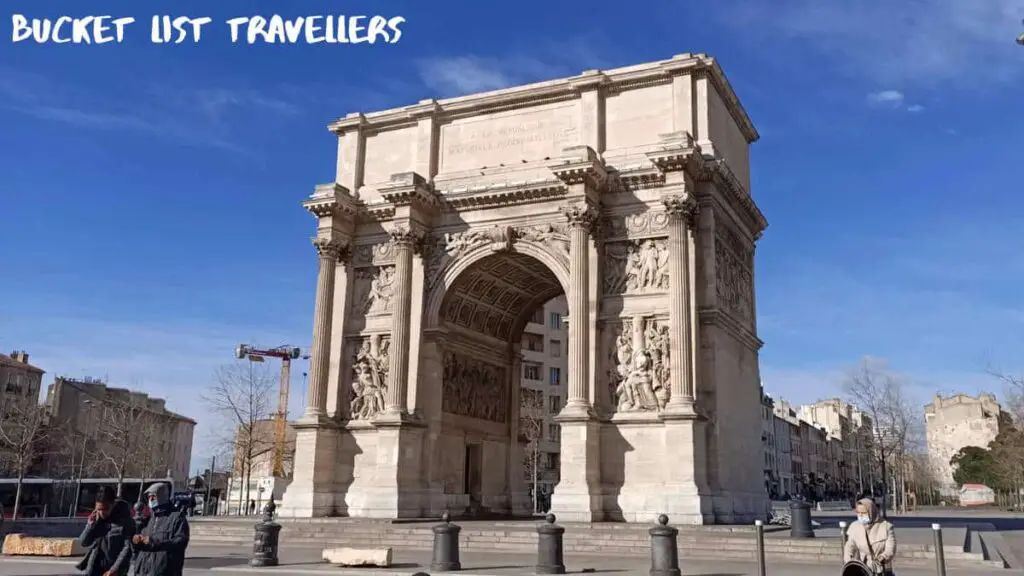
- France flag – a tricolour flag featuring three vertical bands coloured blue, white and red from left to right.
- France coat of arms – this features a lictor’s fasces (a bundle of wooden rods with an axe protruding from the top). This symbol rests on branches of laurel and oak. There is also a ribbon with the national motto “Liberté, égalité, fraternité”. The lictor’s fasces represents magisterial power, law and governance. The oak is the national tree of France and symbolises strength and endurance. The laurel is a symbol of triumph.
- National flower – fleur-de-lis (also known as the lily flower)
- National bird – Gallic rooster
France pastimes
- National dish – Pot-au-Feu
- Popular drinks – Pastis, wine
- National sport – football
- Religion – 41% Catholic, 40% non-religious (as at 2019)
Famous people from Marseille France
- Famous people born in Marseille France – actress France Nuyen, writer Antonin Artaud, actress Simone Simon, actor Louis Jourdan, Queen of Sweden Désirée Clary, astronomer Pytheas, ballet dancer Marius Petipa, dancer and choreographer Maurice Béjart, conductor Paul Mauriat, model Isabelle Caro, Poet Edmond Rostand
- Sports stars from Marseille France – Olympic swimmer Jean Boiteux, Olympic distance runner Jean Bouin, footballer Éric Cantona, footballer Jean-Luc Ettori, footballer Mathieu Flamini, Olympic canoeist Jessica Fox, tennis player Sébastien Grosjean, footballer Frank Lebœuf, Olympic swimmer Alain Mosconi, footballer Louisa Nécib, alpinist Gaston Rébuffat, Olympic shooter Anthony Terras, footballer Zinedine Zidane
Is Marseille France Safe?
France travel guide: Safety in Marseille France
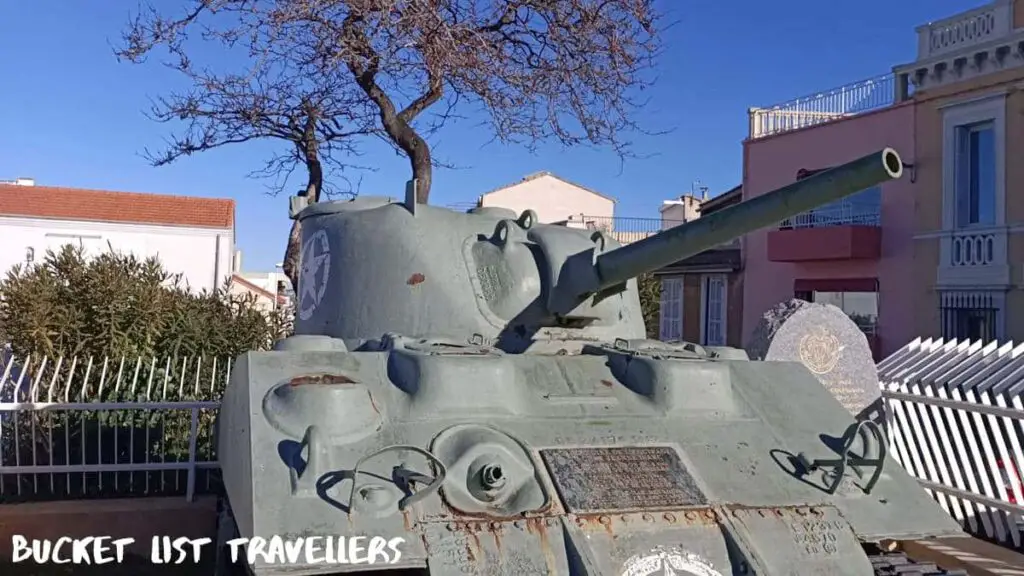
We travelled through France for two months and found the country on the whole to be extremely safe. However Marseille does have a reputation as a more dangerous city, with one of the highest crime rates and murder rates in Europe. As with any city, there are good areas as well as bad areas. Watch out for pickpockets in Marseille, particularly in public transport and crowded areas. Also, make sure no-one is watching whenever you are entering pin codes and never lose sight of your credit card when making a purchase.
General safety considerations in France
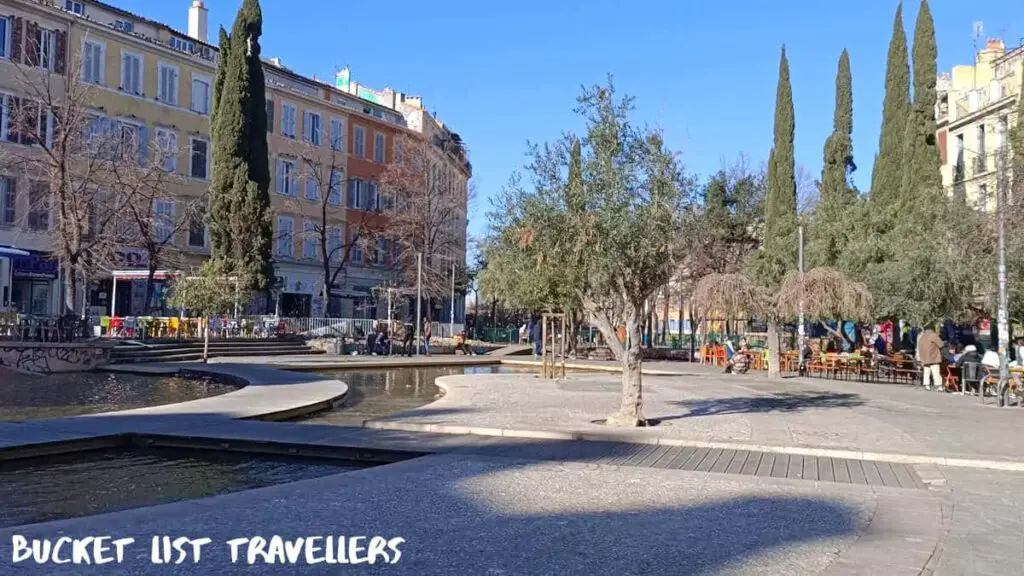
Other general safety considerations for travel in France:
- Drinking water – The tap water is safe to drink in Marseille.
- Mosquitoes – the tiger mosquito has been present in France since 2004. This type of mosquito spreads diseases such as Zika, dengue and chikunguya.
- Road safety – French motorways are the safest in continental Europe. However the National and Departmental roads are much less safe. Additionally, roads are the leading cause of violent death in the country. Take care on the roads in France.
- Water safety – If you visit any of the beaches or waterways near Marseille take care when swimming as currents and waves may be stronger than you expect.
- Sun safety – Exposure to the sun can have adverse short-term and long-term effects on the skin, eyes as well as the immune system. Sun protection such as sunscreen, a hat and sunglasses is very important to ensure you don’t get burnt.
As with any destination, take all of your normal safety precautions.
France Blogs
You can find our France travel blogs below.
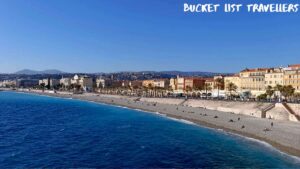
20 Best FREE Things To Do in Nice France (with map)
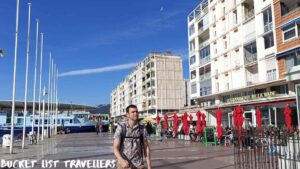
15 Best FREE Things To Do in Toulon France (with map)
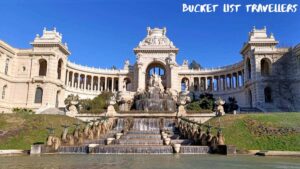
24 Best FREE Things To Do in Marseille France (with map)

18 Best FREE Things To Do in Avignon France (with map)

10 Best FREE Things To Do in Nîmes France (with map)
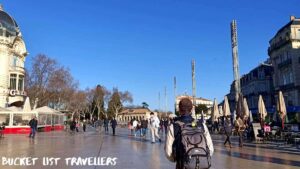
14 Best FREE Things To Do in Montpellier France (with map)
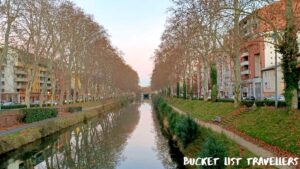
17 Best FREE Things To Do in Toulouse France (with map)

10 Best Things To Do in Carcassonne France (with map)

10 Best FREE Things To Do in Carcassonne France (with map)
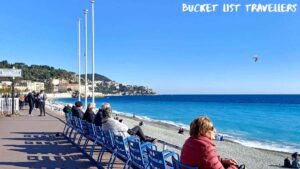
Nice Destination Guide (2024): What You Need to Know
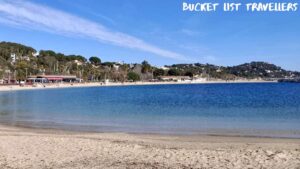
Toulon Destination Guide (2024): What You Need to Know
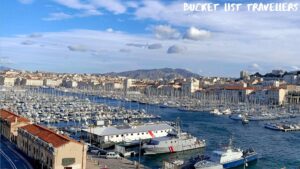
Marseille Destination Guide (2024): What You Need to Know

Avignon Destination Guide (2024): What You Need to Know
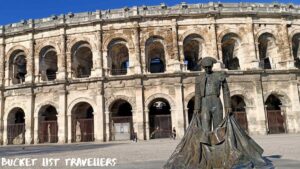
Nîmes Destination Guide (2024): What You Need to Know

Montpellier Destination Guide (2024): What You Need to Know
Affiliate Links
This website contains affiliate links, which means we may earn a commission on any purchases at no additional cost to you. Your support helps us continue our travels and make more travel blogs and travel videos, thank you!
